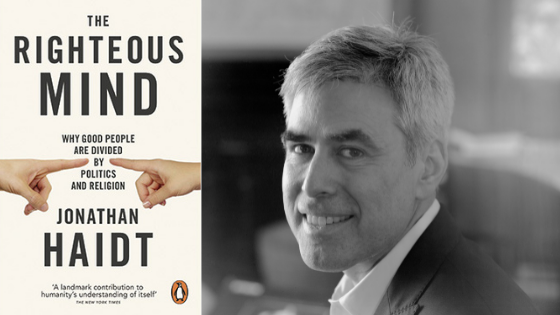Jonathan Haidt is a miracle-worker. With the Righteous Mind, he may have accomplished the impossible – making conservatives and liberals intelligible to each other.
At the heart of this book lies the social intuitionism model and Moral Foundations Theory, Haidt’s biggest contributions to the field of social psychology. Haidt posits that rather than being rational, we find ways to rationalize our moral intuitions. The metaphor he uses is that of an elephant with a rider – the elephant being our powerful subconscious moral intuitions steered along the way by a rationalizing rider.
Political polarization happens due to conservatives and liberals having very different moral intuitions that blind them to the wisdom of each other’s ideologies. Of the 6 moral foundations that Haidt has identified (care vs harm, liberty vs oppression, fairness vs cheating, authority vs subversion, loyalty vs betrayal, sanctity vs degradation), liberals only care about the first 3, while conservatives care about all 6 roughly equally.
In other words, conservatives might have a more complex sense of morality than liberals, which helps them attract more people. The metaphor that Haidt uses (and he does love a good metaphor) is that we have different moral receptors corresponding to each of the 6 foundations, similar to how we have different taste buds for salty, sweet, spicy, bitter etc food. Liberals harm themselves in the polls by only appealing to 3 receptors, while conservative ideology appeals to all 6.
Another valuable insight from this book would be Haidt’s assertion of our dual nature. We are neither primarily selfish nor selfless – we are both simultaneously. We are 90% chimp and 10% bee – 90% individualistic and self-interested, but with a “hive switch” that turns on our “groupish” self-transcendent nature.
Of course, as a former highly partisan liberal himself (and now a centrist), Haidt has spent more time persuading liberals of the merits of conservative philosophy than the other way around. This going easier on conservatives would be my main criticism of the book. While I acknowledge the importance of all 6 moral foundations, I’m not particularly convinced that conservatives have it right in weighing all 6 equally.
Overall, The Righteous Mind is engaging, thought-provoking and makes us less judgemental of our fellow beings. Of all the books I’ve read, this would be the one I recommended the most to those who wish to understand human nature. It is potentially life-changing if you approach it with an open mind and heart.
Top Three Things to Unknow:
- That we are rational beings and that our political preferences are “perfectly rational”.
- That people on the other side of the political spectrum are evil or stupid
- That either moral absolutism or moral relativism is the right approach. Haidt advocates for moral pluralism instead, and I’m inclined to agree.
Who Should Read this book:
- Those with an interest in psychology, politics, religion or sociology
- Anyone looking to become more complex and integrative in their thinking
Who Shouldn’t Read this Book:
- Those with an ideology that steers towards the far-left or the New Atheists (Sam Harris, Christopher Hitchens, Richard Dawkins and Daniel Dennett). Haidt may be an atheist himself, but he’s not the type with a burning hatred for religion – he contends that religion has done more good than bad.
- Those looking for specific strategies on how to talk/appeal to members on the opposite side of the spectrum, or on how to fix political divides.
- People who are close-minded and unwilling to acknowledge that people with opposing views might just have some valid points.
Favourite quotes:
- “Morality binds and blinds. It binds us into ideological teams that fight each other as though the fate of the world depended on our side winning each battle. It blinds us to the fact that each team is composed of good people who have something important to say.”
- “If you think that moral reasoning is something we do to figure out the truth, you’ll be constantly frustrated by how foolish, biased, and illogical people become when they disagree with you. But if you think about moral reasoning as a skill we humans evolved to further our social agendas—to justify our own actions and to defend the teams we belong to—then things will make a lot more sense.”
- “Anyone who values truth should stop worshipping reason.”
- “Intuitions come first, strategic reasoning second.”
- “The human mind is a story processor, not a logic processor.”
- “Everyone cares about fairness, but there are two major kinds. On the left, fairness often implies equality, but on the right it means proportionality —people should be rewarded in proportion to what they contribute, even if that guarantees unequal outcomes.”
- “The very ritual practices that the New Atheists dismiss as costly, inefficient and irrational turn out to be a solution to one of the hardest problems humans face: cooperation without kinship.”
- “You can’t make a dog happy by forcibly wagging its tail. And you can’t change people’s minds by utterly refuting their arguments.”
- “Understanding the simple fact that morality differs around the world, and even within societies, is the first step toward understanding your righteous mind.”

